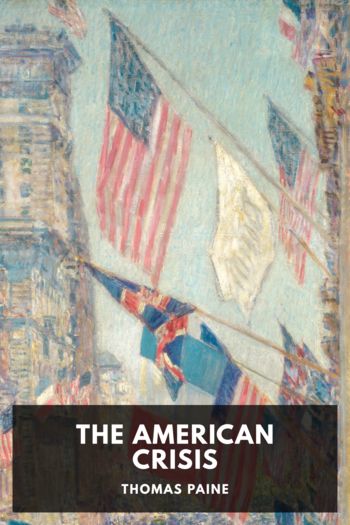Fateful Lightning: A New History of the Civil War & Reconstruction, Allen Guelzo [best thriller novels of all time txt] 📗

- Author: Allen Guelzo
Book online «Fateful Lightning: A New History of the Civil War & Reconstruction, Allen Guelzo [best thriller novels of all time txt] 📗». Author Allen Guelzo
VICTORY BY BALLOT
The summer of 1864 was one of the gloomiest seasons of the war for Lincoln and his administration. Grant was bogged down below Petersburg after a campaign that had cost the Union staggering casualties, Sherman was still struggling slowly toward Atlanta, and the Alabama was still burning Northern merchantmen on the high seas. To add insult to injury, Lee detached from the Army of Northern Virginia four infantry divisions and four cavalry brigades under General Jubal Early (about 14,000 men) and sent them on a raid into the Shenandoah Valley. Lee hoped that Early’s raid, like “Stonewall” Jackson’s in 1862, would draw off Federal troops from the Petersburg siege. In the event, not only did Early chase the Federals out of the Shenandoah, but on July 11 he even dared to cross the Potomac and make a lunge at Washington. Grant was forced to pull an entire infantry corps (Horatio Wright’s 6th Corps) out of the Petersburg lines and send it to Washington, where the troops arrived just in time to fend off an attack by Early on the outer ring of Washington’s fortifications. Early merely drew off into Maryland, where he extorted immense ransoms from the citizens of Hagerstown and Frederick. When the citizens of Chambersburg, Pennsylvania, refused to pay a ransom of $500,000 for their town, Early unhesitatingly burned the town to the ground. “The entire heart or body of the town is burned,” wrote one despairing civilian. “The Courthouse, Bank, Town Hall, German Reformed Printing Establishment, every store and hotel in the town, and every mill and factory in the space indicated, and two churches, were burnt,” along with “three and four hundred dwellings… leaving at least twenty-five hundred persons without a home or a hearth.” 66
Lincoln faced opposition from other quarters than just Jubal Early in the summer of 1864. Supreme Court interference in his war powers and proclamations remained a vivid possibility until Roger Taney’s death in October, and the president continued to endure criticism and harassment from the Democrats, and especially from the Peace Democrats, who seized on Grant’s overland campaign as an example of Republican butchery and incompetence. But with the fall of 1864 meaning another presidential election, Lincoln also now had to deal with a rising tide of disgruntlement from within his own Republican party, some of it within his own cabinet.
Salmon P. Chase, Lincoln’s secretary of the Treasury, had always considered himself better presidential material than Lincoln, and he had been sorely disappointed in 1860 when he was passed over for the Republican nomination. “He never forgave Lincoln for the crime of having been preferred for President over him,” wrote Alexander McClure, the prominent Pennsylvania Republican, “and while he was a pure and conscientious man, his prejudices and disappointments were vastly stronger than himself, and there never was a day during his continuance in the Cabinet when he was able to approach justice to Lincoln.” 67 Chase’s disappointment had not abated after three years of serving as Treasury secretary, and he was particularly incensed at Lincoln’s habit of parceling out tasks to the members of his cabinet as though they were so many errand boys, rather than paying earnest heed to the presumably wiser counsel that Chase longed to unburden himself of. Now, with the 1864 election looming large and the armies conquering little, Lincoln was looking more and more like a liability to the Republican Party, and Chase’s moment seemed to have come at last.
In December 1863 Chase’s supporters began building a boom for Chase as a dump-Lincoln candidate. The marriage of his daughter, Kate Chase, to Rhode Island governor William Sprague gave Chase a foothold in New England politics and unlocked the Sprague fortune and the blockhouse-like Greek Revival mansion at 6th and E Streets in Washington that Sprague bought for the secretary’s political uses. In February 1864 Chase’s political manager, Kansas senator Samuel C. Pomeroy, arranged for the publication of a pro-Chase pamphlet, The Next Presidential Election, which declared that a second term for Lincoln would be a national calamity, that the next president needed to be a statesman with a record of advanced economic thinking, and that Lincoln was manifestly inferior to Jefferson Davis as an executive. Though the pamphlet did not expressly advocate a Chase presidency as the alternative, it was clear that no more likely person to fill such a need was then living in the Republic than Salmon P. Chase. The pamphlet itself was a cheap, discreditable essay in political character assassination, and it looked all the more cheap for having been distributed to Senator John Sherman’s Ohio constituents by means of Sherman’s postage-free frank.68
The impact might not have been nearly so embarrassing for Chase had not Pomeroy also boiled down its essential points into a “strictly private” circular letter to Republican Party backers two weeks later naming Chase—“a statesman of rare ability and an administrator of the highest order” whose “private character furnishes the surest guarantee of economy and purity in the management of public affairs”—as the proper successor to Lincoln. The idea that Chase would sit in Lincoln’s cabinet and encourage his political foot soldiers to stab Lincoln in





Comments (0)